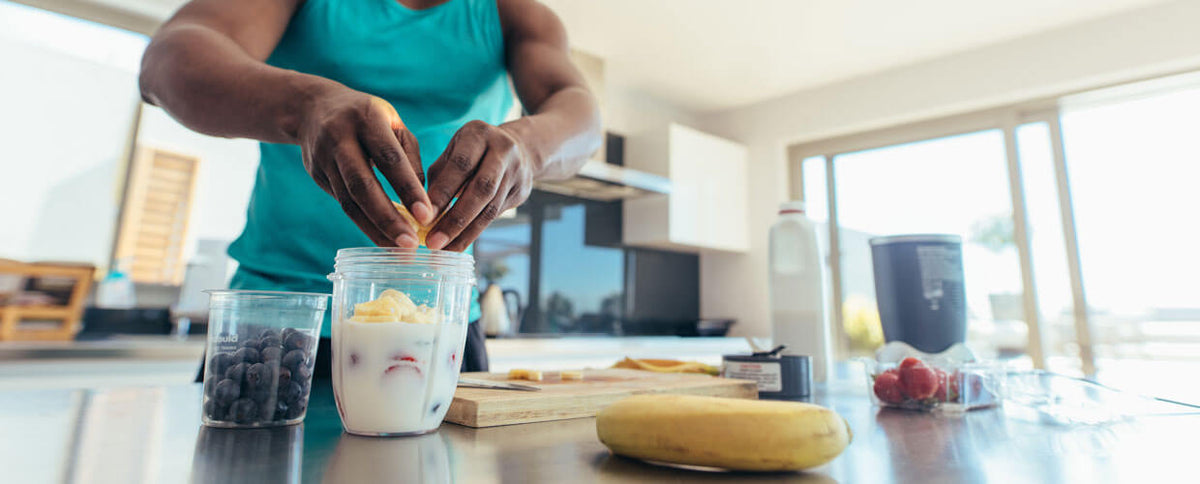The Ultimate Guide to the Post-Workout Recovery Shake

We want to ensure that you recover SMART after your workout. Click here to browse nutrition products in the Spartan store, including shakers, protein, tea, and more.
There is nothing more satisfying than rewarding yourself, at the end of a sweat session, with a recovery shake (or a smoothie, if that’s more your speed). But whether you buy it or blend it yourself, you may be sipping on a sugar bomb instead of an after-workout shake that will help restore your body and muscles, which could ultimately affect your next workout. “It is no secret that optimal nutrition enhances athletic performance,” says Brittany Modell, MS, RD, CDN and the founder of Brittany Modell Nutrition and Wellness. “When it comes to protein shakes, you want to make sure they incorporate all of the macronutrients — protein, carbs, and fat. The protein is especially important when the drink is used as a recovery aid.” Here’s how to build a Spartan-worthy recovery shake, so you can give your body what it needs and none of the junk that will slow it down.
Your Guide to Maxing the After-Workout Shake
How Much Protein Do I Need?
While the amount of protein depends largely on your weight and activity level, Modell says for a post-recovery shake you’ll want to drink between 20 g to 30 g of protein. In fact, research from The Academy of Nutrition and Dietetics found that the right balance of protein and carbs during recovery resulted in improved net protein balance post-exercise (which helps muscle growth and strength), making it important to get the protein equation right so your shake doesn’t wind up too carb-heavy. “Athletes need slightly more protein than other people do to repair the small amounts of muscle damage,” says Modell. “The average protein intake of male endurance athletes should be 1.1 g to 2.0 g of protein per kilogram of body weight while the average protein intake of female endurance athletes should be 1.1 g to 1.8 g of protein per kilogram of body weight.” When in doubt, aim for 20 g to 25 g of protein for each meal and snack, including your recovery shake.
Related: Beyond-the-Smoothie Protein Powder Recipes
Read the Label Before You Buy
If you’re going the convenience route and buying a recovery shake, it’s important to check out the label before you crack that lid. “When it comes to protein shakes I am less concerned about the exact macronutrient breakdown and more concerned about the quality and ingredients,” says Modell. “Many store-bought protein shakes tend to be full of sodium, additives, refined oils, and artificial sweeteners.” And even though you may be getting in 20 g of protein, the other ingredients in that bottle may be negating the effects of maintaining body weight and replenishing glycogen stores in order to properly regain energy. “When choosing a recovery shake, always read the ingredients and choose one with minimally processed ingredients,” says Modell. This means if you can’t pronounce an ingredient, you should probably put that bottle back on the shelf.
Related: 5 Mistakes You’re Making With Your Smoothies
Drink It Fast
Not literally, of course, but if you go the recovery shake route you should consume it within two hours of exercising in order to fully reap the benefits. “When it comes to muscle protein synthesis [the act of repairing muscles after exercise], protein timing is crucial,” says Modell. Research published in Medicine and Science in Sports Exercise states the best way to maximize recovery is by consuming roughly 10 g of essential amino acids, which comes out to about 15 g to 25 g of protein up to two hours after exercise. This is what can make the right recovery shake so great, because you can make it ahead of time and grab it on the go if you don’t have time to eat a proper recovery meal. For a go-to recipe, Modell suggests keeping it simple and blending together whole food ingredients like fruit, nut butter, some high-quality protein powder, and ice.
Related: 3 Post-Workout Nut Butter Smoothie Recipes
You Don’t Need a Shake, Unless You Want One
Here’s the thing about recovery shakes: They are not a necessity when it comes to your Spartan training. “I always believe in whole foods first, but I understand that protein shakes can sometimes be more portable and convenient, or you may not be hungry after a workout,” says Modell. This means that if you want a shake, then go for it (as long as you follow the rules above). But if you’re just as happy getting your protein, carbs, and fat through a recovery snack like sliced avocado on whole grain toast, or some Greek yogurt and a handful of nuts, then go that route instead. “People tend to overestimate their protein needs, but in reality whole foods can typically provide ample protein,” says Modell.



